In 1964, Cassius Clay, then only 22, brashly boasted that he would upset 7-1 favorite Sonny Liston for the world heavyweight championship. “I am the greatest!” he shouted. In retrospect, Clay clearly was the greatest. Why did his outbursts upset so many white sportscasters and fans?
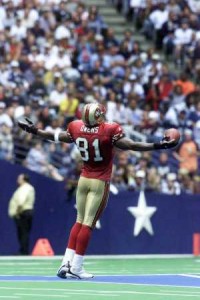 In 2000, San Francisco 49er big personality and wide receiver Terrell Owens was hit with a one-week suspension and a $24,000 fine for twice placing the football on the opposing team’s mid-field logo after scoring a touchdown. The claim was that Owens incited the crowd and disrespected his opponent. Did he?
In 2000, San Francisco 49er big personality and wide receiver Terrell Owens was hit with a one-week suspension and a $24,000 fine for twice placing the football on the opposing team’s mid-field logo after scoring a touchdown. The claim was that Owens incited the crowd and disrespected his opponent. Did he?
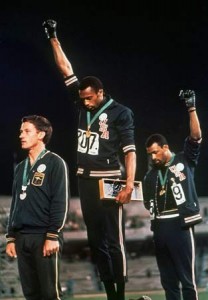 Many similar incidents later, in the Dallas Cowboys 2008 opening game, Owens was hit with a 15-yard penalty for dropping into a sprinter’s starting position and emulating Olympics gold medalist Usain Bolt after catching a second quarter touchdown pass. The NFL has a rule against excessive celebration. Why?
Many similar incidents later, in the Dallas Cowboys 2008 opening game, Owens was hit with a 15-yard penalty for dropping into a sprinter’s starting position and emulating Olympics gold medalist Usain Bolt after catching a second quarter touchdown pass. The NFL has a rule against excessive celebration. Why?
Last month, Denver Broncos wide receiver Brandon Marshall caught what turned out to be the winning touchdown in a 34-30 victory over the Cleveland Browns. He reached into his pants to pull out a half-black, half-white glove, intending to put it on and raise his fist like sprinters Tommie Smith and John Carlos did at the 1968 Olympics. Marshall explained his intentions in the post-game interview below (starting at 0:24).
[youtube 5mVYo693bK8 nolink]
But when teammate Brandon Stokley ran over and convinced Marshall that the penalty that would almost certainly ensue might cost Denver the game, the glove disappeared.
Marshall wanted to celebrate unity and the racial progress of America’s multicultural society. His gesture would have transcended sport and national boundaries. It was only two days after the historic U.S. presidential election, so from as far away as Chennai, India, blogger/journalist Siddhartha Mishra of Express Network Private Limited commented, ”Marshall was a historic moment away from becoming the first athlete to publicly honour US president-elect Barack Obama” Why did the rule book prohibit a statement that would have done more for this country than any football victory?
Since the NFL and the NBA got serious about this in 1984, there have been scores of such behaviors and resultant penalties. Why should we care?
In a 2003 paper (International Review for the Sociology of Sport) entitled “Race and Penalized Sports Behaviors,” UC Berkeley professor Herbert D. Simons asserts that because black athletes are overwhelmingly responsible for such prohibited behaviors, the sanctions levied are racially motivated.
There are a number of verbal and non-verbal behaviors exhibited by football and basketball players, such as trash talking, taunting, celebrating, dancing, etc., that are penalized and heavily criticized by the athletic officials, coaches, the media and fans. The amount of attention these behaviors receive seems out of proportion to their importance, since they provide little if any competitive advantage and seem to be only peripherally related to the actual competition….These behaviors are a reflection of urban African American cultural norms, which conflict with white mainstream norms. The sanctions represent white male mainstream society’s response to the threat to white masculinity represented by black athletic superiority and by African American athletes’ assertion of the right to define the meaning of their own behavior. In this contested terrain, African Americans are resisting white male hegemony and asserting their manhood and cultural identity.
Simons contends that some sportsmanship values are culturally relative:
[T]hey conflict with the cultural patterns of many [African American] athletes participating in basketball and football for whom appearing to be humble, showing respect for one’s opponents, and not calling attention to oneself is less valued than in mainstream white male society….In a multicultural society like the US, groups differ in their histories and cultural values….[The] expressive features of African American culture are…coping mechanisms made necessary because African Americans have historically been denied the opportunity to achieve respect and self-esteem through the traditional means of education and jobs. [F]or African American males, sports [has] been a major vehicle for asserting manhood and gaining the respect and self-esteem that flows from it….[C]elebrating, dancing, high stepping, spiking, dunking, [and] taking off one’s helmet are reflections of the expressiveness and performance aspect of African American culture. These behaviors are a performance…and are not necessarily directed at their opponents. They are designed to encourage spectators and teammates to validate one’s performance by responding to it. The desire for audience involvement may be related to the call and response features of African American churches.
Is the prohibition of these behaviors, as Simons contends, racially motivated? The culture of white owners and officials is:
“so fundamental, pervasive, ingrained, invisible, and normal that [they are] not even aware of its existence…..[T]he invisibility of one’s own culture makes it difficult to recognize behavior that conflicts with one’s own cultural expectations as an expression of a different cultural pattern. Behaviors that differ are seen as abnormal and deviant….When African Americans behave according to the standards of their culture, they make whites feel uncomfortable….(Black athletes] pose a threat to white male control of sports….In response to this threat, they have made normal African American behavioral expression abnormal and deviant by penalizing these behaviors.
One has only to look at sports in which African American do not participate in large numbers to see the hypocrisy. Score a goal in the NHL or world soccer and the athletes go wild. No penalties.
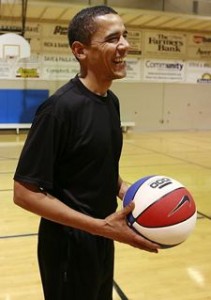 A young, black, athletic man will soon be our president. He has already offered an opinion—unrequested and probably unappreciated by the NCAA—about how college football should decide the national champion. His presence alone will engender cultural shifts in many areas. Sports is surely one of the less important spheres, but its ubiquity in our culture—almost every newspaper gives more column inches to sports than to national news—means that its lessons have much influence. And these lessons remain long after the knees give out.
A young, black, athletic man will soon be our president. He has already offered an opinion—unrequested and probably unappreciated by the NCAA—about how college football should decide the national champion. His presence alone will engender cultural shifts in many areas. Sports is surely one of the less important spheres, but its ubiquity in our culture—almost every newspaper gives more column inches to sports than to national news—means that its lessons have much influence. And these lessons remain long after the knees give out.
Loosen up. Let the players dance.


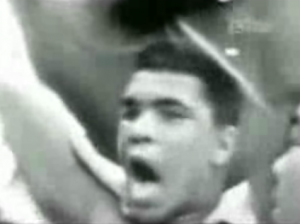
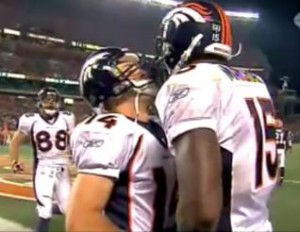




7 Comments on “Rule Book Racism: Can a Black Athlete Celebrate?”
You write: “A young, black, athletic man will soon be our president.” Why don’t you call him white? He’s just as much white as black.
Is my wife, Karina, yellow or white, Japanese or American? Her mother is 100% Japanese, and her father from Georgia is white with a touch of native american.
I have responded to Lanny’s comment in a separate post:
http://stevecotler.com/tales/2008/12/12/racial-identity-hapa-obama/
I am not an NFL or NBA owner, nor do I know any personally (or even by casual acquaintance), so I am not in a position to judge if their motives are racially-motivated. Even so, my knee jerk reaction is that the celebration penalties are considered unsportsmanlike, so that is why they are banned. Here’s why:
1. Nobody is penalized for natural celebrating with their teammates – in fact you see it all the time. Whites, blacks, asians, shouts, yells, hugs, headbutts, jumping butt smacks, you name it. I think anyone can hoot and holler all they want in joy. The penalties are primarily based on premeditated dances or actions intended to elicit specific (negative?) responses from the fans, opposing teams, or media. Perhaps the NFL and NBA don’t believe they are solely intended as a celebration.
2. Baseball. Generally considered a self-policing sport in terms of sportsmanship. Why isn’t this an issue then in baseball? Mostly white owners and lots of African American players. Are these players being held back from their natural emotions? Are MLB owners less racist and controlling (I doubt that!) Maybe, but it is interesting that it is almost never portrayed on the field – white or black. If baseball players can keep it off the field (the premeditated celebrations perceived to be poor sportsmanship), then why can’t the NBA and NFL? And I don’t buy the reason is because the NFL and NBA are more contact based – baseball players play with just as much passion as any other athletes, with of course the exception of the LA Dodgers.
3. The Haka Example. Two or three years ago the University of Hawaii football program was in the center of a controversy surrounding their short haka, a Maori war chant, before games. The Warriors were assessed a 15-yard penalty for unsportsmanlike conduct in one game after the WAC officials saw the dance for the first time. The NCAA has rules against unsportsmanlike conduct, but none specifically mentions the haka. Seems now that they do the dance and nobody cares either way. It was later discovered that several NFL teams also perform the haka pre-game ritual, and since then, there aren’t any concerns or penalties for conducting it. So were the original WAC opinions racist and trying to oppress the Maori? I doubt it. I suspect that they assumed it was being done to intimidate the other team and might be perceived as poor sportsmanship from the other teams. I speculate that it isn’t an issue any more because all parties involved (meaning the other team) didn’t think it was unsportsmanlike.
But before I dismiss the racism claim, why are the premeditated celebrations conducted more frequently by African Americans than Caucasians? Also, has anyone asked these NFL and NBA players if they think it is racism? Perhaps answers to those questions would help shed some insight.
If they don’t agree with the rules, then maybe they should go do something else. Instead of making millions of dollars every year just to play a game.
Also, you say that fans and the media disagree with their antics. So why defend so few people that make waves than go against societal norms?
Response to Dave:
I did not say that the black athletes “don’t agree with the rules.” Whether or not these athletes agree is not the issue. They flaunt the rules because black culture (in church, in dress, in performance) honors ostentation and personal expression of style…and these athletes are willing, perhaps even pleased, to take the penalty in return for the self-expression. In general (and this is a generalization), African Americans seem to be more apt to take actions that white America would (in general) consider showing off.
And I am sure they are thrilled to be “making millions.”
Also, I did not say that fans disagree with current celebratory expressions; I was referring to Cassius Clay acting out in the early 60s. Times were much different then. Racism was on the surface of our society. It had been only 15 years or so since Jackie Robinson had broken the color barrier in sport (other than boxing). As for the celebration that occurs these days, I think that many fans enjoy the antics and the color (pun intended) they add to the game. New England Patriots wide receiver Wes Welker scores a touchdown and makes a snow angel? Come on! That’s fun!
Your last sentence hits at the heart of my argument, and actually underscores my conclusion. The “societal norms” are different for blacks and whites. That’s precisely my point.
This is nothing more then the white power structure deep hatred of black people! Blacks can play the game of football basketball and other sports! But the white power structure decide how they celebrate their victory. This is the same in the military black are past over for promotion because of the racist power structure in the military. In government we see the same! White in the establish white power structure continue to disrespect and show American that one black President change NOTHING! The white power structure attack young black men with basketbal talent. Making it a rule that they must be 18 year old age! Now many say that that efects whites too! Your right but that what happen when the white power structure attack black WE all are under attack! To think celebrating piss the white power structure OFF!
Comments are closed.